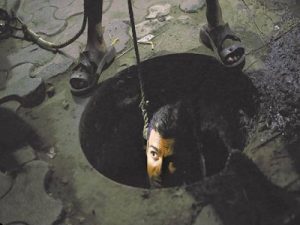In most manual scavenging deaths, no FIR filed, no compensation to kin: Study
 A study on 51 cases involving the deaths of 97 manual scavengers across the country shows that in a majority of the cases, no FIR was filed nor was the mandatory compensation given to the families. In not a single of these cases was prosecution carried out. Likewise, not one child from these families has received the government’s pre-matric scholarships meant for them.
A study on 51 cases involving the deaths of 97 manual scavengers across the country shows that in a majority of the cases, no FIR was filed nor was the mandatory compensation given to the families. In not a single of these cases was prosecution carried out. Likewise, not one child from these families has received the government’s pre-matric scholarships meant for them.
The study was carried out in 11 states by Rashtriya Garima Abhiyan, the coalition of civil society organisations working towards eradication of manual scavenging. It is based on interviews carried out in 51 cases of septic tank and sewer cleaning fatalities which claimed the lives of 97 sanitation workers and left behind 70 survivors with minor to serious injuries.
The study found that FIR was filed in only 35 per cent of the cases i.e. in 18 cases. In a majority of the FIRs filed, IPC section 304 A (death caused due to negligence) was applied against individuals or municipal officials who engaged the workers but no arrests were ever made except in one case in Bengaluru. Moreover, the mandatory post-death compensation amount of Rs 10 lakh was awarded in only 16 cases. In cases where the FIRs were not filed, the survey shows that families stated they were forced to go in for a compromise or threatened to keep silent.
Ninety-four per cent of families of the deceased belong to the Scheduled Caste category (mostly Valmikis) while the remaining four and two per cent are from Other Backward Classes and Scheduled Tribes, respectively.
The Rashtriya Garima Abhiyan along with Bezwada Wilson’s Safai Karamchari Andolan was involved in the NITI Aayog-commissioned recent count of manual scavengers in India.
Ashif Shaikh from Rashtriya Garima Abhiyan told The Indian Express that under-reporting of these cases, as well as non-payment of compensation, are all part of attempts to not acknowledge the prevalence of the practice which was outlawed way back in 1993. “We have included cases of deaths since back then only to see if anything has changed. But things still remain the same. On 2nd October this year, while celebrations were held for the Swachh Bharat campaign, there was silence on this particular issue that everyone is aware of. The UN Special Rapporteur in his report last year highlighted the problem of manual scavenging in India but the UN General Secretary didn’t say anything on it nor did any the Prime Minister or the other ministers on the dais at the sanitation event on Gandhi Jayanti,”
The report states that 37 per cent of those who died were in the age group of 15-25, another 35 per cent were between 25 and 35 years of age while 23 per cent was in the age group of 35-45 years.
The study, which also looks at self-employment schemes administered by the Ministry of Social Justice found that not a single family whose members have died while cleaning the septic tank or the sewer was rehabilitated in alternative jobs. In most case, this has meant that yet another family member simply replaces the deceased person in manual scavenging due to lack of any alternatives.
The report states, “In complete violation of basic human rights and dignity, Dalits of India continue to be pushed to practise caste-based occupations such as manual scavenging. This type of discrimination emanates from the notion of purity and pollution and untouchability, deeply rooted in the mindset of upholders of caste in the country. ..Dalits engaged in manual scavenging such as Valmiki, Mehtar, Dom, Bhangi, Har, Hadi, Ghasi, Olgana, Mukhiyar, Thoti, Hela and Halalkhor are compelled to perform the task of cleaning human excreta with bare hands or to clean sewer lines and septic tanks.”
Source: The Indian Express





